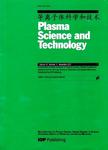Role of Ion Beam Irradiation and Annealing Efect on the Deposition of AlON Nanolayers by Using Plasma Focus Device
Role of Ion Beam Irradiation and Annealing Efect on the Deposition of AlON Nanolayers by Using Plasma Focus Device作者机构:Department of Physics Government College University38000 Faisalabad Pakistan National Institute of Education Nanyang Technological UniversitySingapore 637616Singapore Department of Physics GC University54000 Lahore Pakistan
出 版 物:《Plasma Science and Technology》 (等离子体科学和技术(英文版))
年 卷 期:2013年第15卷第11期
页 面:1127-1135页
核心收录:
学科分类:07[理学] 0805[工学-材料科学与工程(可授工学、理学学位)] 070204[理学-等离子体物理] 0702[理学-物理学]
基 金:supported by the Higher Education Commission of Pakistan
主 题:characterization XRD focus shots X-ray diffraction nucleation surface layer
摘 要:AlON nanolayers are synthesized on Al substrate by the irradiation of energetic nitrogen ions using plasma focusing. Samples are exposed to multiple (5, 10, 15, 20 and 25) focus shots. Ion energy and ion number density range from 80 keV to 1.4 MeV and 5.6×10^19 m^- 3 to 1.3×10^19 m ^-3, respectively. Moreover, the effect of continuous annealing (473 K and 523 K) on an AlN surface layer synthesized with 25 focus shots is also examined. The main features of the X-ray diffraction (XRD) patterns with increasing focus shots are: (i) variation in the crystallinity of AlN along (111), (200) and (311) planes, (ii) increasing average crystallite size of AlN (111) plane, and (iii) stress relaxation observed in AlN (111) and (200) planes. The crystallinity of AlN surface layer is comparatively better at 473 K annealing temperature. A broadened diffraction peak related to an aluminium oxide phase showing weak crystallinity is observed for 15 focus shots while non-bounded oxides are present in all other deposited layers. Raman and Fourier transform infrared spectroscopy (FTIR) analysis confirm the presence of AlN and Al203 for the surface layer annealed at 473 K temperature. Raman analysis shows that the overlapping of AlN and Al2Oa results in the development of residual stresses. Scanning electron microscope (SEM) results demonstrate that the formation of rounded grains (range from 20 nm to 200 nm) and variations in their microstructures features depend on the increasing number of focus shots. Decomposition of larger clusters into smaller ones is observed.



